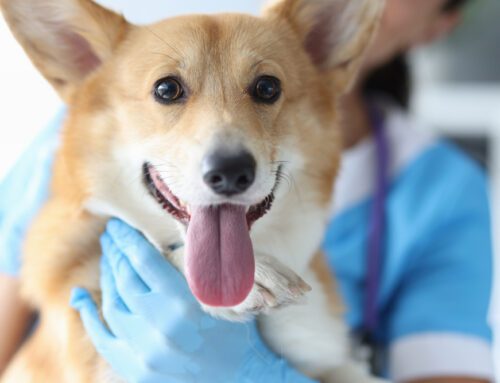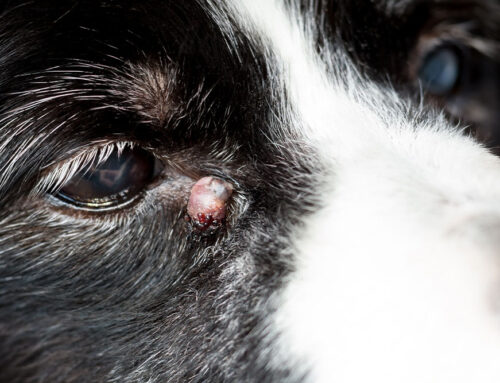Kennel Cough in Dogs: Protecting Your Pet From Contagious Coughs
Your dog comes home from boarding, the park, or the groomer and suddenly develops a hacking cough. Could it be kennel cough? And how do you know when it’s serious?
This highly contagious respiratory disease spreads quickly wherever dogs gather. At Village Animal Hospital, we see kennel cough frequently and help families manage both prevention and treatment. Understanding how this illness spreads, what symptoms to watch for, and when to seek veterinary care can protect not only your dog but the entire community.
Understanding Kennel Cough: Essential Information for Pet Owners
What Is Kennel Cough?
Kennel cough, officially known as Canine Infectious Respiratory Disease Complex (CIRDC), is a contagious upper respiratory infection that inflames the trachea and bronchi- the tubes that carry air to the lungs. This inflammation produces the hallmark harsh, dry, “honking” cough that gives the disease its name.
Multiple pathogens can be responsible, including Bordetella bronchiseptica bacteria and viruses such as canine parainfluenza, adenovirus, and canine influenza. These agents may act alone or together, causing airway irritation and sometimes secondary infection.
Despite the name, dogs don’t need to visit a kennel to catch it. Anywhere dogs mix- boarding facilities, dog parks, grooming salons, or shelters- can create opportunities for exposure.
How Kennel Cough Spreads
Kennel cough spreads through respiratory droplets and contaminated surfaces. When an infected dog coughs or sneezes, bacteria or viruses linger in the air or settle on bowls, bedding, and toys. Healthy dogs inhale these particles or pick them up through direct nose-to-nose contact.
Crowded areas and poor ventilation increase risk, as does stress, which can suppress immunity. Most dogs develop symptoms within three to seven days after exposure.
Recognizing the Symptoms of Kennel Cough
Common Signs to Watch For
The most recognizable sign is a persistent, honking cough that sounds like gagging or choking on something stuck in the throat. Coughing often worsens with excitement, exercise, or gentle pressure on the neck from a collar.
Other mild signs include sneezing, nasal discharge, or occasional eye discharge. Most dogs with mild kennel cough remain alert and maintain a normal appetite. However, if your dog seems listless, loses interest in food, or breathes abnormally, the infection may be deepening.
When to Schedule a Veterinary Visit
Even mild cases can become concerning. Schedule a veterinary appointment if your dog:
- Has been coughing for more than 3–4 days with no improvement
- Coughs hard enough to retch, vomit, or interrupt sleep
- Shows reduced appetite or thirst
- Develops colored nasal discharge instead of clear mucus
- Becomes unusually quiet or tired
At this stage, your veterinarian can check lung sounds, measure temperature, and prevent complications like pneumonia. Early treatment- such as cough suppressants or anti-inflammatories- often shortens recovery and keeps mild illness from turning serious.
When Kennel Cough Becomes Dangerous
In some dogs, infection progresses to pneumonia or triggers severe respiratory distress. Warning signs include labored or rapid breathing, wheezing, fever, or a moist, productive cough. Puppies, seniors, and dogs with chronic conditions are at higher risk.
Short-nosed breeds like Bulldogs, Pugs, and French Bulldogs are especially vulnerable due to Brachycephalic Obstructive Airway Syndrome (BOAS). Even mild airway swelling can make breathing difficult.
If your dog shows open-mouth breathing, flaring nostrils, or fatigue after minimal exertion, treat it as an emergency.
When to Seek Veterinary Care
Contact your veterinarian or emergency clinic right away if your dog develops:
- Respiratory distress or difficulty breathing
- Rapid or labored breathing even at rest
- Blue-tinged or pale gums
- Lethargy, collapse, or refusal to eat
- Fever above 103°F
- Coughing that lasts longer than a week
Respiratory infections can sometimes unmask or worsen underlying heart or lung conditions. Signs of heart disease in dogs include coughing at night, exercise intolerance, and sudden fatigue. Because these illnesses can mimic kennel cough, prompt evaluation ensures your dog receives the right treatment.
Diagnosis: Getting to the Root of the Cough
A veterinary exam helps distinguish mild kennel cough from more serious diseases like pneumonia or tracheal collapse. Your veterinarian may recommend:
- A full physical exam, including listening to the lungs
- Chest X-rays to check for lung infection or heart enlargement
- Laboratory testing or PCR panels to identify pathogens
- Oxygen level checks in severe cases
At Village Animal Hospital, our diagnostic services pinpoint the cause of coughing and guide treatment for faster recovery.
Treatment Options: What to Expect

Medical Treatments
Most mild cases resolve within one to three weeks as the immune system clears infection. Antibiotics may be prescribed if Bordetella or secondary bacterial infection is suspected. Cough suppressants and anti-inflammatories can ease irritation and help your dog rest.
Dogs with pneumonia or severe airway inflammation may need hospitalization for oxygen therapy and IV antibiotics. Short-nosed breeds prone to airway collapse may benefit from humidified oxygen therapy to soothe inflamed airways.
Home Care and Comfort Measures
For at-home recovery:
- Provide a calm, well-ventilated space
- Offer fresh water and balanced nutrition
- Use a humidifier to ease airway irritation
- Switch from a collar to a harness
- Limit activity until coughing subsides
Avoid smoke or strong scents that can worsen coughing. Keep your dog away from other dogs for at least two weeks after symptoms appear.
Prevention Strategies to Keep Your Dog Healthy
Vaccination: The Best Defense
The Bordetella vaccine is the cornerstone of prevention. It’s available in injectable, intranasal, and oral forms- your veterinarian will recommend what’s best for your dog’s lifestyle.
Many facilities require current Bordetella vaccination. Immunity takes one to two weeks to develop, so plan ahead. Some dogs with frequent exposure may need boosters every six months. Vaccination reduces risk and severity even if exposure occurs, and we discuss your dog’s needs at every wellness appointment.
Preparing for Boarding and Group Activities
- Verify vaccines are current
- Allow 7–14 days for immunity to build
- Ensure the facility is clean and well-ventilated
- Minimize stress with familiar bedding and toys
If your dog has chronic heart or respiratory issues, ask whether boarding is safe- sometimes in-home care is better.
The Importance of Ongoing Veterinary Care
Regular wellness exams help prevent illnesses like kennel cough and identify early signs of other respiratory or heart conditions. If your dog’s cough worsens or breathing becomes difficult, we offer emergency services during business hours for urgent cases such as respiratory distress or pneumonia.
Our diagnostic and treatment capabilities allow us to stabilize your dog quickly and provide effective care.
Frequently Asked Questions
Can kennel cough spread to cats?
While rare, Bordetella bronchiseptica can affect cats, particularly in shelters or multi-pet homes.
What if my dog has a collapsed trachea or chronic heart disease?
Pre-existing airway issues and heart conditions can worsen with kennel cough. These dogs should be monitored closely and may need specialized medications or oxygen therapy.
Protecting Your Dog’s Respiratory Health
Kennel cough is often mild, but in the wrong circumstances, it can quickly escalate. Recognizing early warning signs, keeping vaccines current, and acting promptly when symptoms appear help prevent serious complications.
At Village Animal Hospital, we provide compassionate, full-service care for dogs with coughing, breathing changes, or respiratory illness. If your dog develops a persistent cough or you want to review preventive options, please request an appointment.
Our team is here to ensure your dog breathes easier- today, tomorrow, and every day.








Leave A Comment